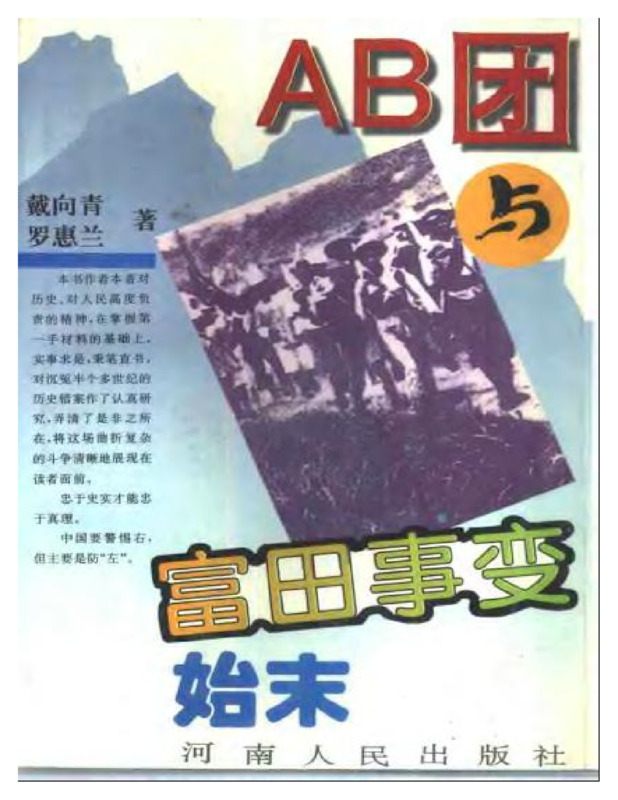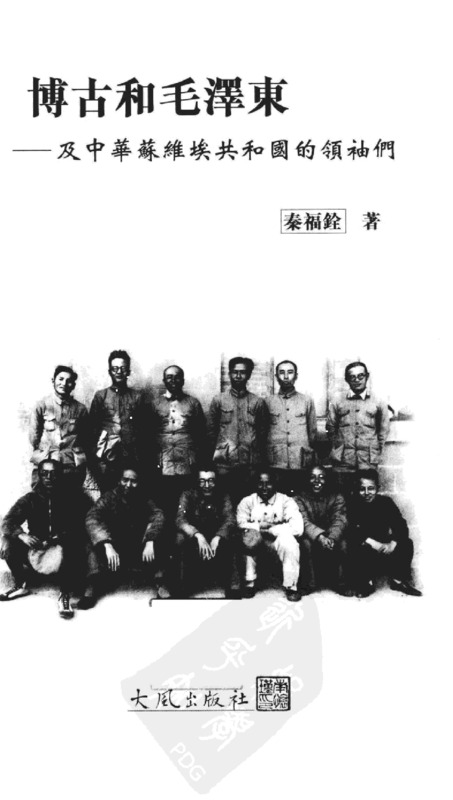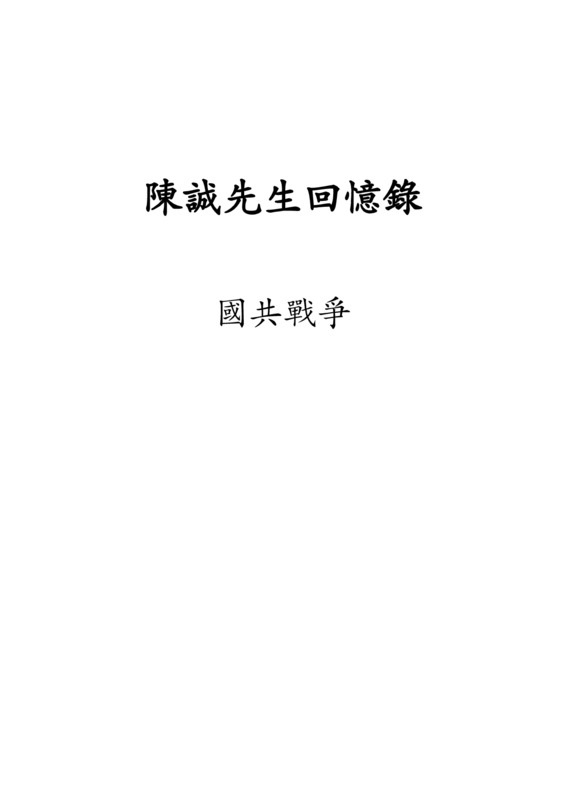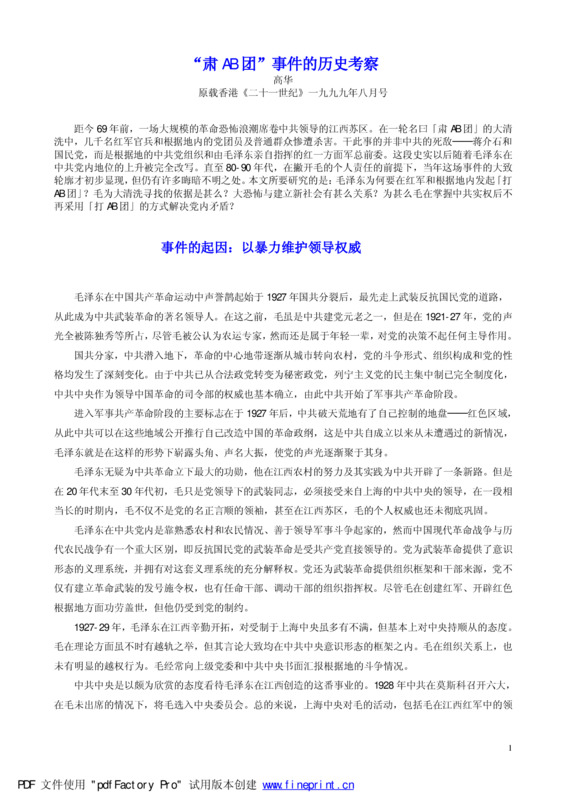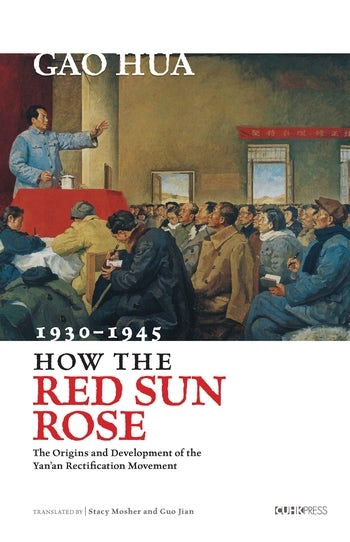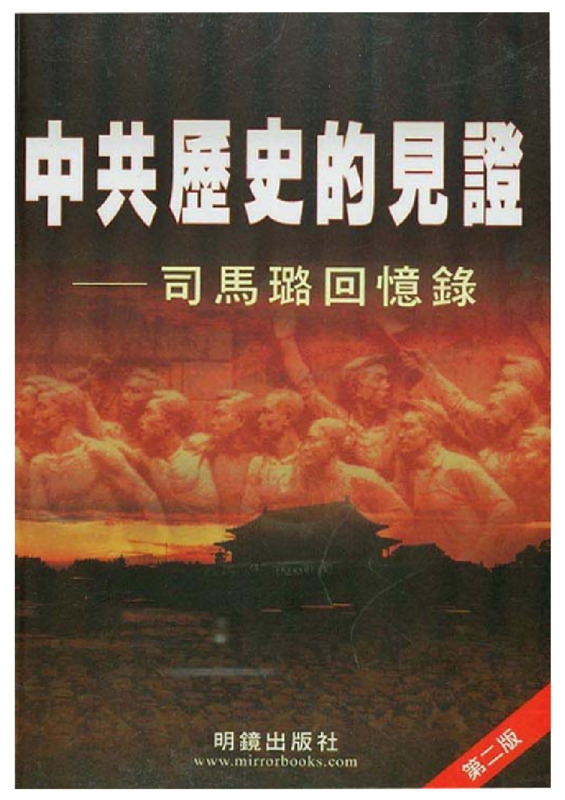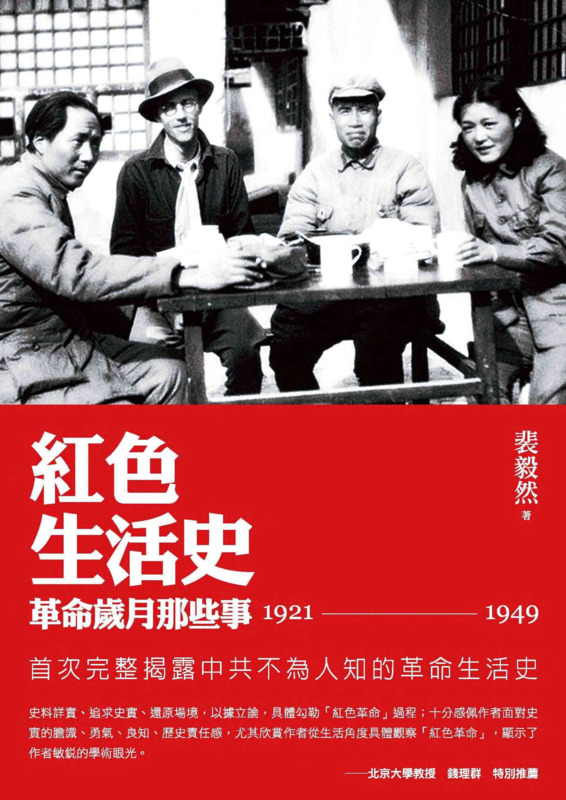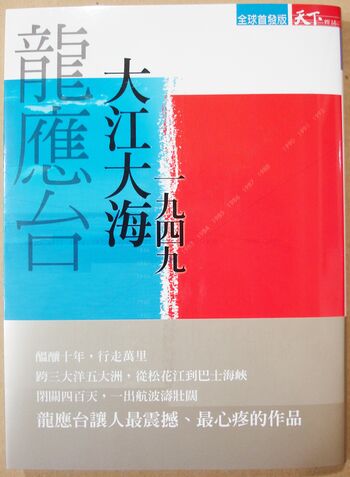Explore the collection
Showing 26 items in the collection
26 items
Book
AB Corps and the Futian Incident
In 1930, a mutiny erupted in the Red Army in the town of Futian. In the ensuring purge, more than 700 officers were executed. After this, the campaign to root out Anti-Bolshevik (AB) groups spread to various parts of China, with 70,000 executed. Occurring just nine years after the founding of the CCP, it is one of the earliest and most significant purges in the party's early history.
The first person to pay attention to the Futian Incident was Professor Dai Xiangqing of the Jiangxi Provincial Party School. Starting in late 1979, he and other colleagues went to southern Jiangxi to collect materials, conduct interviews and investigate, and found that this was an unjust and wrong case, and began to publish articles on the matter.
In the early 1980s, Dai Xiangqing sent his article to a senior general in the PLA, Xiao Ke. After that, the research on the Futian Incident attracted the attention of senior central officials. The CCP's party history research agency sent people to Hunan and Jiangxi to investigate and collect materials. The Organization Department of the Central Committee of the Communist Party of China sent a review team for the Futian Incident and reported the vindication documents to the central government, but even today there is currently no official conclusion on the matter.
This book is an important study of the early history of the Communist Party of China, often mentioned by prominent independent historians, such as Yang Kuisong. As an officially recognized research project, this book does not make ideological breakthroughs, but its detailed historical materials, and its data index make it particularly valuable for understanding this historical event.
This book was published by Henan People's Publishing House in 1994.
Book
At the Crossroads of History
This book is Gao Hua's next masterpiece after *How the Red Sun Rose*. It entails a selection of papers published by the author between 1988 and 2004, covering the fields of Republican history, Communist Party history, and contemporary Chinese history. It captures the historical interaction between the present and the past. Gao reflects deeply on the far-reaching Chinese Communist Revolution. With a rigorous and empirical research methodology, he sketches a complex and colorful picture of history, presenting the multiple facets of twentieth-century China's history.
Book
Bo Gu and Mao Zedong - and the Leaders of the Chinese Soviet Republic
Bo Gu (博古), real name Qin Bangxian (秦邦憲), was the top leader of the Chinese Communist Party (CCP) from 1931-1935, leaving his post as General Secretary of the CCP after the Zunyi Conference. The author of this book, who is Bo Gu's nephew, describes some important historical points in the early days of the Communist Party, the various activities among the top leaders of the CCP, such as Mao Zedong, and their relationships through the narratives and circumstantial testimonies of a number of knowledgeable people.
Book
Chen Cheng's Memoirs—The War between the Nationalists and Communists
Mr. Chen Cheng (courtesy name Cixiu; alias Shisou) served as the commander of the KMT army, commander-in-chief of the group army, commander-in-chief of the theater of operations, and chief of the general staff of the KMT. After the defeat of the Kuomintang army in Taiwan, Chen Cheng served the Administrative Yuan as Vice President of the Kuomintang. The volumes associated with *Chen Cheng's Memoirs* were published by Taiwan's National Museum of History in 2005. The series is divided into six volumes: *The Northern Expedition and the Chaos* (one volume), *The War between the Nationalists and Communists* (one volume), *The War of Resistance Against Japanese Aggression* (two volumes), and ***The Construction of Taiwan*** (two volumes). The first volume, *The War between the Nationalists and Communists* includes three parts: *Suppressing the Communists - Memories of the Military*, *Summary of Mr. Chen's Words and Actions*, and *Correspondence and Telegrams*. The book has original historical materials related to the five sieges and the counter-insurgency. In particular, this is the first time that important historical materials regarding the correspondence between Chiang Chung-cheng (courtesy name of Chiang Kai-shek) and Cixiu have been made public.
Book
China's "Left Scourge"
The author of this book, Lu Jianhua (pen name Wen Lu), was a former member of the Chinese Academy of Social Sciences who published this book in 1993. He was sentenced to 20 years in prison in 2005 for "allegedly leaking state secrets" in connection with the "espionage case" involving journalist Cheng Xiang.
Book
Collected Papers of Wu Yisan (1)
Writer Wu Yisan is the founder of Hong Kong's May 7 Society, an organization dedicated to the collection, research and publishing of everything related to the anti-rightist campaign in 1957,to restore and present the truth about a period of history characterized by severe persecution of remedial intellectuals. Over the years, Mr. Wu has devoted himself to compiling The Dictionary of Names of 1957 Victims. As the Chief Editor of The Hong Kong May 7 Society Publishing House, he also published The Biography of the Rightists of the May 7.
This book is a collection of his political papers, comprising more than 50 published and unpublished essays primarily written between 2004 and 2009, criticizing CCP from various perspectives, including history, current affairs, and culture.
Book
Collected Papers of Wu Yisan (2)
Writer Wu Yisan is the founder of Hong Kong Five-Seven Society, an organization established in 2007 and dedicated to the collection, research and publishing of everything related to the Anti-Rightist campaign in 1957, to restore and present the truth about a period of history characterized by severe persecution of intellectuals. Over the years, Mr. Wu has devoted himself to compiling *[The Dictionary of Names of 1957 Victims](https://minjian-danganguan.org/collection/1957%E5%B9%B4%E5%8F%97%E9%9A%BE%E8%80%85%E5%A7%93%E5%90%8D%E5%A4%A7%E8%BE%9E%E5%85%B8)*. As the Chief Editor of The Hong Kong Five-Seven Society Publishing House, he also published *The Biographies of the 1957 Rightists* and *[New Biographies of the 1957 Rightists](https://minjian-danganguan.org/collection/%E2%80%9C%E4%BA%94%E4%B8%83%E2%80%9D%E5%8F%B3%E6%B4%BE%E5%88%97%E4%BC%A0%EF%BC%88%E4%B8%8A%EF%BC%89)*.
This book is a collection of Wu’s political essays, including nearly one hundred of his published and unpublished essays and speeches between 1999 and 2017, including historical and current affairs analyses, with an emphasis on commentaries of persecuted intellectuals and political dissidents. These people are often called "traitors of China (han jian)" by CCP, but Wu Yisan argues that the CCP is the real traitor that betrays the country and its people.
Our archive also hosts another anthology of his, *[Is Chen Yi a Good Comrade](https://minjian-danganguan.org/collection/%E6%AD%A6%E5%AE%9C%E4%B8%89%E6%94%BF%E8%AE%BA%E6%96%87%E9%9B%86%EF%BC%881%EF%BC%89)*?
Article
Historical Examination of the Purge of the "AB" Regiment
More than 70 years ago, a massive wave of revolutionary terror swept through the CCP-led Jiangxi Soviet Union. Thousands of Red Army officers and soldiers, as well as members of the Party and the general public in the base area, were brutally murdered in a purge called the "Purging of the AB Troupe." Gao Hua's article examines why Mao Zedong initiated the "purge of the AB Group" in the Red Army and the base areas. What was Mao's rationale for the Great Purge? What is the relationship between the Great Terror and the establishment of a new society? Why did Mao stop using the "Fighting the AB Groups" as a means of resolving internal conflicts in the Party after he assumed real power in the CCP?
Book
How the Red Sun Rose
Originally published in Hong Kong in Chinese in 2000, Gao Hua’s epic description of an early Communist Party campaign against dissent describes a pattern of thought reform and control that would hold true for decades to come. Written despite official harassment and Gao’s failing health, How the Red Sun Rose is a touchstone for China’s unofficial history movement. It was translated into English in 2019 and published by Columbia University Press. Purchase here: https://cup.columbia.edu/book/how-the-red-sun-rose/9789629968229.
Book
In the Palm of Buddha (Updated Edition)
Zhang Dongsun is an unavoidable but deliberately obscured figure in modern China. Considered the earliest translator of Western philosophy, a famous newspaperman, political commentator, and professor at Yenching University; the first mediator between the Kuomintang and the Communist Party in 1949, and the first Central People's Government Member. He was convicted of treason in 1951 and disappeared. The well-known writer and journalist Dai Qing completed this historical documentary after eight years of investigation and writing and nearly ten years of revising and updating. Taking Zhang Dongsun's life as the main theme, he wrote about changing times from the late Qing dynasty to the Cultural Revolution.
An expanded edition of this book will be published by the Chinese University of Hong Kong Press in 2022. The following is the link to purchase books from the publisher:
https://cup.cuhk.edu.hk/index.php?route=product/product&product_id=3466
Book
Mao: The Unknown Story
This book presents the dramatic life of Mao Zedong, revealing a wealth of unheard-of facts: why Mao joined the Communist Party, how he came to sit at the top of the Chinese Communist Party, and how he seized China step by step. Writers Jung Chang and her husband Jon Halliday took ten years to complete this book, interviewing hundreds of Mao's relatives and friends, Chinese and foreign informants and witnesses who worked and interacted with Mao as well as dignitaries from various countries.
Purchase link:https://www.amazon.com/Mao-Story-Jung-Chang/dp/0679746323.
Book
Memoirs of Sima Lu: A Witness to the History of the Chinese Communist Party, The
Sima Lu (1919-2021) was an expert on the history of the Chinese Communist Party. He joined the Chinese Communist Party in 1937, then was politically persecuted in Yan'an, left it, and was expelled from the Party in 1941. In 1952, Sima Lu published “Eighteen Years of Struggle” in Hong Kong, writing about his tortuous journey from defecting to the Communist Party to his awakening and eventual choice of freedom. It became a sensation. He has made in-depth special studies on several leading figures of the CCP, such as Qu Qubai and Zhang Guotao. His memoir, “Witness to the History of the CCP”, is divided into three chapters according to its contents: the first is about his personal experience, the second about the first generation of CCP figures, and the third is devoted to the struggle between Mao Zedong and Zhou Enlai.
Book
Newly Discovered Mao, The: Volume I
Author Wang Ruoshui spent his early years studying philosophy at Peking University. He served as deputy editor-in-chief of the Communist Party newspaper “People's Daily” and was able to participate in high-level ideological discussions, gaining a deep understanding of Mao Zedong as a person and of his thought. He was one of the rare intellectuals within the CCP system who had an independent personality as well as the ability to think for himself. After his death from cancer, his wife, Feng Yuan, helped put together this posthumous book. Published by Ming Pao Press in 2002, it has been described as "the first and most comprehensive and in-depth discussion of Mao Zedong and his thought."
Book
Newly Discovered Mao, The: Volume II
Author Wang Ruoshui spent his early years studying philosophy at Peking University. He served as deputy editor-in-chief of the Communist Party newspaper "People's Daily" and was able to participate in high-level ideological discussions, gaining a deep understanding of Mao Zedong as a person and his thought. He was one of the rare intellectuals within the CCP system who had an independent personality as well as the ability to think for himself. After his death from cancer, his wife, Feng Yuan, put together this posthumous book. Published by Ming Pao Press in 2002, it has been described as "the first and most comprehensive and in-depth discussion of Mao Zedong and his thought.
Article
Poppies under the Red Sun: The Opium Trade and the Yan'an Model
In the 1990s, history scholar Chen Yongfa made a fundamental study of the opium economy two decades before the founding of the CCP and completed a monograph, "Poppies under the Red Sun: The Opium Trade and the Yan'an Model". Since then, more and more research articles have been written on the subject, and new information has appeared. Subsequently, the phenomenon of the opium economy of the CCP's Yan'an regime has also became an important field of study.
Book
Red Life History - The Revolutionary Years (1921-1949)
Professor Pei Yiran's book is the first complete revelation of the untold revolutionary history of the CCP. The book covers many important points in the history of the CCP, including the use of Soviet rubles to build the party, the landlords fundraising campaign, and the love life of Mao Zedong and Jiang Qing, among subjects.
Book
Seventy Years of the Chinese Communist Revolution
Professor Chen Yongfa's book examines the history of the Chinese Communist Party from the perspective of modern Chinese history. It divides it into three stages: revolutionary seizure of power, continuous revolution, and farewell revolution. It delves into three major issues in CCP history: nationalism, grassroots power structure, and ideological transformation and control. published by Taiwan's Linking Publishing in 2001.
Book
Sky Burial: The Fate of Tibet
In this book, author Wang Lixiong presents his arguments with a great deal of personal experience and field work. The book covers the history of the Tibetan issue, the current situation, and various aspects. The book was first published by Mirror Books in Hong Kong in 1998, and an updated edition was released in 2009.
Book
The Great River and the Sea: 1949
This book by Taiwanese author Lung Ying-tai, published by Taiwan's <i>World Magazine</i> in 2009, is a detailed account of the history related to the period before and after the 1949 Nationalist-Communist Civil War from a literary perspective. After ten years of preparation, Long Yingtai traveled for 400 days to Changchun, Nanjing, Shenyang, Matsu, Taitung, and Pingtung to visit many survivors of the Nationalist-Communist Civil War.
